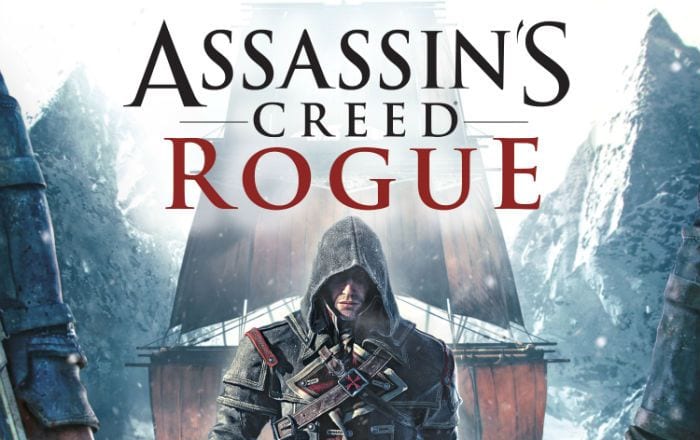
Written by Laird Allen
Assassin’s Creed: Rogue
Iterative Iterations with an Irish Accent
I have always had an ambiguous relationship with the Assassin’s Creed series (Here abbreviated as AC for readability’s sake.). The games are generally quite well polished, and the dependence on certain central mechanics- parkour and stabbing, mostly- means that each new game has an unchanging core that is now about six games deep. New AC titles often add some new mechanic – AC: Brotherhood added the Assassin’s Bureau, AC4 4 added piracy – that adds to the essential gameplay without muhc changing it. Often there are adjustments made to the difficulty curve (AC: Brotherhood and AC: Revelations were famously easy to the point of being essentially movies) but the core gameplay remains the same for every year-in, year-out iteration. This makes reviewing them tricky, because the AC games have, generally speaking, ridiculous stories, and that’s pretty much all we have to cover here.
It’s also worth mentioning that AC: Rogue in a compromising position because of its awkward placement with the release of the new console generation. There was a public statement of support for the Xbox360/PS3 generation from the developers at Ubisoft, which included the implication that the forthcoming AC: Unity would be available on the older system. This turned out not to be the case, as Unity was launched as an exclusive on the new platforms, and this left the studio in an awkward situation. AC: Rogue was rushed into production and released after a very short development cycle even for an Assassin’s Creed game, and it shows.
AC: Rogue follows the story of Shay Patrick Cormac, an Irish Assassin who learns terrible secrets about the Brotherhood and ends up joining their nemesis organization, the Templars, turning his back on the Assassins and hunting them down in a series of conflicts throughout the North Atlantic against the backdrop of the French and Indian War. Cormac gets a ship early on, reusing the piracy mechanics of AC 4, and becomes a prominent businessman, reusing the “renovation” mechanic from AC 2 and onward. The gameplay is exactly what you are expecting- a combination of very simple parkour and counter based combat, naval battles, assassinations, chases, et cetera. There are absolutely no surprises save for the addition of an air rifle that replaces the blowgun of AC4 and re-adds the use of various types of grenade, absent from the series since AC: Revelations. The game does tease you with the possibility of really impacting history (at one point, you are sent to assassinate Washington, only to discover it’s Lawrence, not George) but none of it has any real weight – the game links together AC3, AC4, and AC Unity, and the other three games already claimed most of the interesting historical events and personas.
Where Rogue really falls apart is where all the AC games have their weak point. The writing is loose, goofy, and unconvincing. The characterizations are uneven, and even one of the few high points of the AC formula- the death scenes, with the victims soliloquizing their final moments away – seem cheap. Shay is a character, but that’s all he is, and the voice acting is never more than average. Not even the Irish accent and ponytail are enough to make him compelling, which is a shame, because the idea of playing a Templar is cool- its just irritating that they play exactly the same as the Assassins. While this has interesting philosophical implications – especially in the Illuminatus Trilogy way, which perhaps coincidentally was coauthored by a Robert Shay, of making both sides perhaps more alike than they realize- the game goes nowhere with it. The modern time period sections are lifted directly from AC4 and add effectively nothing save more hamhanded dialogue.
There are other troubles. Rogue is plagued by bugs and by inconsistencies in location design which makes the parkour – especially in such locations as an ice sheet or ancient temple- fiddly at best and a game of guesswork at worst. While the Canadian/American Northeast makes a beautiful setting, and certainly a novel one, the game glosses over any material changes this might make to the sailing with the occasional iceberg and a warning that “cold water drains your health.” The music adds some Celtic flare to the Assassin’s Creed motifs but it’s hardly noticeable. The buildings and ships are mostly if not entirely reused from AC4 so there’s little enough to criticize or praise there. Someone did an excellent job of recycling already completed work, and that person saved Ubisoft a ton of money, but its obvious to any player with any eye for detail.
This game is just more of the same. While I panned Far Cry 4 for this most grievous of sins, Assassin’s Creed: Rogue lacks even Far Cry’s luscious art design and music. If you enjoyed Assassin’s Creed 4, enjoy Rogue. If not, it’s eminently skippable.
Assassin’s Creed: Rogue is by Ubisoft Sofia. It is available on PS3 and Xbox360 as well as Windows PC. It retails for about $29.99 and is suitable for mature gamers.




